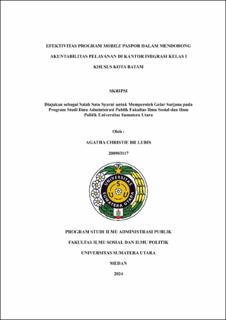| dc.description.abstract | The use of technology in public services offers better capabilities in terms of efficiency and effectiveness to help various types of human work by accelerating the processes carried out. One of them is the M-Passport Application which is one form of electronic government implementation in the immigration sector. The implementation of the Mobile Passport Application will be reviewed effectively whether it can realize effectiveness in encouraging service accountability at the Class I Special TPI Immigration Office in Batam City. The purpose of this study is to determine the extent to which the effectiveness of the Mobile Passport program is in encouraging services at the Class I Special TPI Immigration Office in Batam City.
The method used in this study is descriptive research with a qualitative approach. Data collection used interview techniques, observation, documentation and literature. Data analysis qualitatively using effectiveness indicators from Edi Sutrisno (2007) which include program understanding, right on target, on time, achievement of goals, and real change.
The results of this study indicate that the program understanding indicator shows that this program has not been effective in encouraging service accountability. The form of transparency from the Batam Immigration in overcoming problems by conducting online and offline socialization, it can be seen that the responsibility of the Batam Immigration based on offline socialization is inadequate, so that the public still does not fully understand the program. The on- target indicator is fully effective because it shows the responsibility of the Batam Immigration in managing queues and regulating daily passport quotas through routine evaluations and quota adjustments of 200 applications per day, in order to reduce the crowds of queues. The on-time indicator shows that this program has not been effective because the problem of schedule inconsistency between the application and direct services highlights the responsibility of the immigration that is not responsive to the certainty of the services provided, so that the public does not comply with the schedule given by the application and this program is considered not to reflect the actual service process. The indicator of achieving goals shows that this program is effective, because the responsibility of the immigration includes the development, maintenance, and security of the M-Passport application, ensuring that this application is not only easy to use but also runs according to the objectives that have been set. The real change indicator is running fully effectively, based on the responsive form of Batam Immigration in being responsible for overcoming queue and delay problems through the superior features in the application, so that applicants do not need to come to immigration to take care of passports. | en_US |


